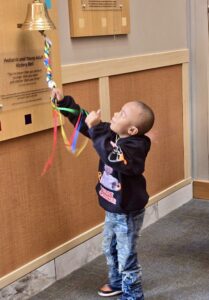Falconer Native Secures Two More Grammys

Randy Merrill, a 1992 Falconer High School graduate, recently won two Grammy Awards. He has won five as a mastering engineer in his career. Submitted photo
Despite a somewhat lengthier journey into the music studio industry than he first anticipated, Randy Merrill continues to find success as a mastering engineer.
Recently winning two Grammy Awards for the Falconer High School Class of 1992 graduate is proof of that.
At the 63rd annual Grammy Awards ceremony, held in and around Los Angeles on March 14, Merrill won for work on Taylor Swift’s album “Folklore,” which took home Album of the Year and for Beck’s album “Hyperspace,” which won in the Best Engineered Non-Classical category.
“The artists, engineers and producers involved in these two albums are all exceptional and at the top of their class,” he told The Post-Journal. “It was a treat to work with such widely talented professionals.”
To date Merrill has been nominated for 10 Grammy Awards, winning five — two for Album of the Year, two for Best Engineered Non-Classical and one for Record of the Year.
“I’m grateful to have had the opportunities to work with many renowned and incredibly talented artists,” he said. “It’s satisfying to be recognized by my colleagues in the Recording Academy for the work that went into these projects.”
As noted in a 2017 profile in The Post-Journal after winning two previous Grammy Awards, Merrill attended Jamestown Community College to study audio production upon graduation from Falconer. He then went to the State University of New York at Fredonia for its recording technology program.
While at SUNY Fredonia, Merrill studied music, audio engineering, and acoustics.
He graduated in 1997 and worked for the Eastman School of Music in Rochester. While there, he said he honed his skills in live and studio recording and mixing, live sound reinforcement, jazz arranging and percussion performance.
Merrill moved to New York City in 1999 and later spent several years working as a technical engineer at Avatar Studios. It was during this time his interest went from the technology side of the music recording business to mastering.
In early 2006, Merrill joined Scott Hull Mastering as Scott’s production engineer. Shortly thereafter he started developing his own clientele. When Hull purchased Masterdisk in 2008, Merrill became a staff engineer there.
In 2013, he began working at Sterling Sound in New York City.
Asked what still motivates him, Merrill noted the desire to turn a recorded piece into “something exciting and inspiring to listen to.” A mastering engineer takes musical content that has been previously mixed and prepares it for use in distribution. That can include physical media such as CDs, vinyl records or streaming audio.
“When I first listen to a mix, I develop an idea of how I think it should sound, so that listeners will be attracted to it,” Merrill said. “I’m then motivated by the desire to bring that idea to fruition.”
For those looking to get into the field, or for those just starting out, Merrill recommends they listen to as much recorded music as possible. Doing so, he said, will train the ear to know what a finished record sounds like.
“Developing this internal database of sound will help the young engineer know when they are on the right path in their record making process or if they need to try a different approach to it,” he said.
As was the case for many industries, COVID-19 did impact the music studio business. Merrill said at the beginning of the pandemic there was uncertainty as to how much it would affect the studios.
“Since we are at the end of the music production chain, we weren’t impacted immediately, but after a month of lockdowns, we started to notice the number of sessions slowing down,” he said. “Through the spring of last year, sessions were quieter than usual but by the summer it picked up and definitely by the fall sessions were back to full capacity.”
He added: “Once artists and bands learned that touring wasn’t an option anytime soon, they turned their focus toward recording more music so that they would have some kind of revenue stream. I consider myself incredibly fortunate to be working during this time, only having had a short slow period last spring.”
Following his wins March 14, Merrill has had plenty to be thankful for, and plenty to thank.
“I would like to thank my parents for believing in my desire to work in the music studio business even though it took many years and countless hours to make a sustainable living at it, much less be successful,” he said. “I’d like to thank Ralph Rasmussen and Ann Marie Mogenhan who were teachers of mine at Falconer High School, and Mike Kelly who was my mentor at JCC. David Kerzner and Dr. Kay Stonefelt my main professors at SUNY Fredonia. And Tom Coyne, my mentor at Sterling Sound, who I worked with until his passing in 2017.”
His parents, Pam and Donald, remain proud of his work. “We just believe that it’s a blessing from the Lord,” Pam Merrill said. “We’ve been proud of him since the day he was born. He was valedictorian of his high school class, and we’ve just been excited in what he has accomplished.”

